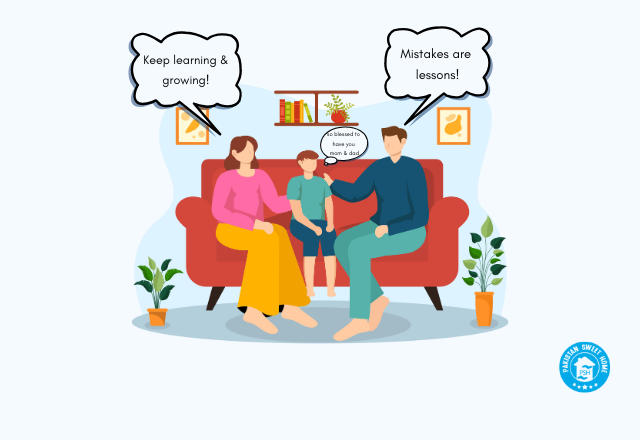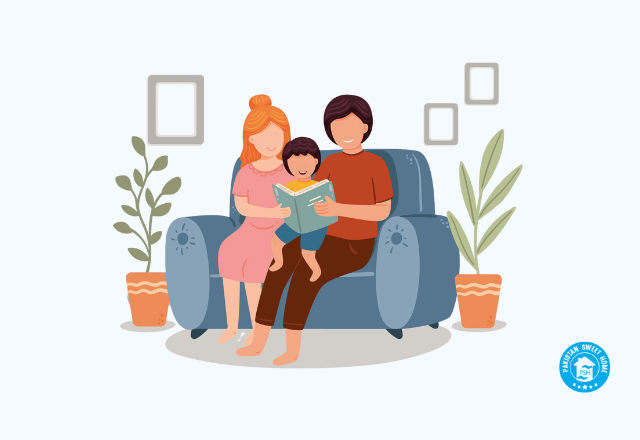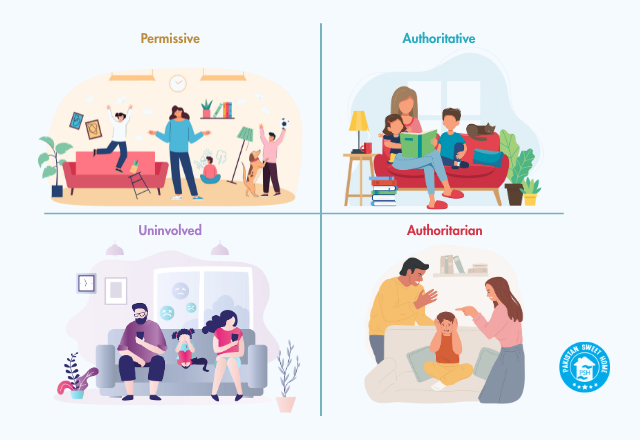
- DONATE
- SPONSOR A CHILD
- Zakat calculator
- SIGN IN
-
- About Us
- FAQ's
- Contact
- Get Involved
- Admissions
- Sign In
- SPONSOR A CHILD ZAKAT CALCULATOR DONATE
-
info@pakistansweethome.org.pk
(051) 4865856
+92 335 1118477
Have you ever stopped to question why you parent the way you do?
Many parents strive for disciplined, respectful children but unknowingly adopt a harmful approach. Authoritarian parenting focuses on strict obedience, often at the cost of emotional connection, confidence, and open communication.
But setting firm boundaries is possible without sacrificing your child’s trust or self-esteem.
Let’s dive into the dynamics of authoritarian parenting and explore healthier alternatives.
Developmental psychologist Diana Baumrind identified the authoritarian parenting style. It typically engages in one-way communication, imposing strict rules with no room for negotiation. These rules are often unexplained, and children are expected to meet high standards without making mistakes.
Errors are typically met with punishment. Authoritarian parents usually maintain high expectations with limited flexibility and less nurturing.
Children raised by authoritarian parents often:
According to Baumrind, a key role of parenting is to help children adopt the values of their culture. However, the way parents approach this can differ greatly, especially in how much control they exert.
Authoritarian parenting is the most rigid style, where obedience is prioritized over self-regulation. These parents enforce strict rules and expect unquestioning compliance, offering punishment instead of guidance or positive feedback.
Here are the defining traits of authoritarian parents:
1. Strict and Controlling
Authoritarian parents establish numerous rules and frequently micromanage every aspect of a child’s life. Even unspoken rules are expected to be followed without clear explanations.
2. Emotionally Distant
These parents tend to be cold or harsh. Rather than offering encouragement or affection, they may resort to nagging or yelling, prioritizing discipline over emotional connection.
3. Harsh Punishments
Authoritarian parenting is severe and immediate. Physical punishment, such as spanking, is common, and positive behavior is rarely acknowledged or rewarded.
4. No Room for Choices
Children aren’t given options. Rules are absolute, and parents expect obedience without negotiation or flexibility.
5. Impatient and Unyielding
There's little effort to explain rules or discuss emotions. Misbehavior is met with frustration, not guidance.
6. Lack of Trust
Authoritarian parents rarely give children the freedom to make decisions. They tightly monitor behavior to prevent mistakes instead of allowing learning through consequences.
7. No Compromise
Rules are seen in black and white. Children have no voice in decisions, and discussions are not open for negotiation.
8. Shaming Tactics
Criticism is common, and shame is used to enforce behavior.
Phrases like “Why can’t you do anything right?” reflect the tone of this parenting style.
There are four patterns of authoritarian parenting.
These parents are highly competitive and push their children to succeed in every area. They create strong routines and discipline but may neglect the emotional connection children need. In their pursuit of perfection and achievement, the emotional bond often takes a back seat.
Motivated by a need for respect and admiration, these parents find it difficult to admit mistakes or accept being challenged as authority figures.
They focus on appearances, believing that if their family seems well-disciplined and orderly, it will earn praise from others.
These parents have little tolerance for mess, disobedience, or imperfection. Often shaped by strict upbringings or trauma like abuse or PTSD, they rely on rigid rules. This need for control can make them less patient and emotionally distant.
Driven by fear or anxiety, these parents view control as essential to keeping things "in order."
They often believe that enforcing strict rules is the core purpose of parenting and may struggle to trust their child’s autonomy.
Assess What’s Your Parenting Approach - Take the Quiz Take this quick and free parenting styles quiz to evaluate your current parenting methods and see if adopting new strategies could benefit you. Instructions: Answer each question based on your typical behavior as a parent. At the end of the quiz, tally your responses to determine which parenting style you most align with. 1. How do you approach setting rules in your household? A) I create clear, fair rules and explain why they’re important to our family. B) I set strict, non-negotiable rules and expect immediate obedience. C) I make rules, but I’m lenient with enforcing them and let my child break them sometimes. D) I don’t set many rules and usually leave my child to decide things on their own. 2. When your child asks for something, how do you typically respond? A) I listen carefully, explain my reasoning, and discuss the decision with them. B) I firmly say "no" or "yes," without much explanation, because I expect compliance. C) I usually let them have what they want to avoid conflict, even if it's not the best decision. D) I don’t often engage in their requests and leave them to figure things out themselves. 3. Your child comes home late without informing you. How do you react? A) I calmly ask for an explanation and make sure they understand the importance of communication. B) I express my anger, give a punishment, and insist they never do it again. C) I might let it slide and avoid confrontation, assuming they’ll be more careful next time. D) I don’t engage in the situation and avoid talking about it. 4. When your child is upset, how do you handle the situation? A) I comfort them, listen to their feelings, and help them work through the issue B) I expect them to handle it on their own and don’t offer much emotional support. C) I try to calm them down, but I don’t always address the root of the problem. D) I tend to ignore their distress, feeling it's not my job to manage their emotions. 5. How do you feel about your child's independence? A) I encourage them to make decisions for themselves while offering support and guidance. B) I try to control their actions, believing it's best if I guide every decision. C) I let them do what they want without many restrictions or much guidance. D) I rarely step in and let them make all the decisions without providing much direction. 6. When your child makes a mistake, what’s your reaction? A) I help them learn from it, offering gentle guidance and suggestions for improvement. B) I get frustrated and make sure they understand the consequences of their actions. C) I don’t make a big deal out of it and usually let them figure it out. D) I ignore the mistake and don’t address it at all. 7. How do you enforce consequences in your household? A) I set consistent, reasonable consequences and explain the reasoning behind them. B) I enforce strict consequences immediately to maintain control and discipline. C) I may overlook consequences or sometimes delay enforcing them, hoping they will learn without punishment. D) I rarely enforce consequences and avoid dealing with issues altogether. 8. How often do you check in with your child's schoolwork or activities? A) I regularly check in and support them with their academic and extracurricular activities. B) I expect them to handle their responsibilities independently without much interference from me. C) I rarely check in, allowing them to manage on their own, unless there’s a problem. 9. How do you handle your child's friendships and social interactions? A) I guide them in choosing positive friends and discuss their social experiences openly. B) I monitor their friendships closely, controlling who they hang out with to ensure good behavior. C) I don’t involve myself much in their friendships, letting them choose who they want to be with. D) I don't intervene in their friendships, and I’m not concerned about who they interact with. 10. If your child disagrees with you, what do you do? A) I encourage open discussion and listen to their point of view, working toward a mutual understanding. B) I firmly assert my point of view and expect others to agree with me. C) I let them disagree and avoid confrontation, letting them have their own opinion. D) I ignore the disagreement and don’t engage in a discussion about it. Scoring and Results
|
Authoritarian parenting is often not a conscious choice—many parents adopt this style unintentionally.
Several factors can contribute to this strict approach:
Many authoritarian parents were raised in similar environments or within cultures that value obedience and discipline over emotional connection. A 2024 study confirmed that the parenting style individuals experience growing up greatly influences how they parent their children.
Studies show that authoritarian parents often score low on agreeableness and struggle with empathy and criticism. This can lead to tense relationships, especially with their children.
They also tend to score higher in neuroticism, a trait linked to emotional instability, anxiety, irritability, and negativity. This can result in more reactive and harsh parenting.
Additionally, they may be lower in openness and extraversion and higher in conscientiousness.
Parents under high stress from work, finances, or personal issues may turn to controlling behavior. This is often a way to cope or maintain order in their lives.
Some parents simply don’t know there are other effective parenting approaches. Without positive parenting guidance, they rely on what they know—strict control and punishment.
In many cultures, especially collectivist societies, obedience, respect for elders, and discipline are seen as vital values. Parents may feel social pressure to maintain strict control to avoid being judged as weak or lenient.
Children are expected to obey and excel, with little room for emotion or open dialogue. These cultural expectations can strongly shape a parent’s approach—even when it leads to emotionally distant relationships.
Parenting styles strongly influence a child’s development. They impact social skills, emotional health, and academics.
Children raised with an authoritarian style often face a range of challenges, such as:
While these children may appear obedient and rule-abiding, they often lack self-discipline when not under direct supervision. That’s because authoritarian parenting emphasizes control over growth, leaving children unequipped to make independent decisions or set personal boundaries.
Authoritative parenting encourages independence, warmth, and clear guidance. In contrast, authoritarian parenting limits a child's freedom to explore or express themselves. Over time, this limits emotional growth, weakens decision-making, and disrupts a child’s sense of self.
Experts agree that rules and boundaries are essential for child development. However, parenting must also include warmth, flexibility, and emotional support.
If you or your partner were raised by authoritarian parents, it’s normal to worry. You may fear repeating those same patterns with your children. You may notice authoritarian traits in your parenting and wish to shift to a balanced style.
Here are some practical ways to avoid an authoritarian approach:
Understanding the principles of authoritative parenting is the first step. Learn how this style fosters independence, emotional intelligence, and resilience. The more informed you are, the more conscious you'll be about your habits and responses.
Give your children space to express themselves without interruption or judgment. Listen patiently and validate their emotions—even if you don’t agree. This builds trust, encourages open communication, and helps children develop self-awareness and emotional regulation.
Create household rules that are age-appropriate, fair, and clearly explained. Make sure all family members, including other caregivers, are on the same page. When children understand why rules exist, they’re more likely to respect them.
When rules are broken, respond with consistent, non-punitive consequences that are directly related to the behavior. Avoid physical punishment or shaming. Instead, guide your child to understand the outcome of their actions and how they can do better next time.
Strive to show affection, empathy, and encouragement, even during moments of correction. This reinforces the message that your love isn’t conditional on behavior.
Pay attention to your triggers. Do you react harshly when stressed, tired, or overwhelmed? Practicing mindfulness and emotional regulation helps you respond thoughtfully rather than reactively.
If you're unsure how to change, consider joining a parenting workshop or reading expert books.
You could also consult with a family therapist for personalized guidance. Learning new strategies and practicing them can help reshape your household dynamic.
Here are some examples of authoritarian parenting:
“Because I said so, and that’s final.”
No room for questions or explanations. Obedience is expected without reasoning.
“Stop crying, or I’ll give you something to cry about.”
Suppresses emotional expression instead of validating the child’s feelings.
“Go to your room—I don’t want to hear it.”
Shut down communication rather than discussing the issue.
“You must get straight A’s, or there will be consequences.”
Places high expectations with pressure, without offering support.
“You’re wearing what I picked. No arguments.”
Doesn’t allow autonomy or decision-making, even in personal matters.
“Do the chores exactly the way I told you—no shortcuts.”
Insists on control over how things are done, even minor tasks.
In conclusion, authoritarian parenting is a strict style that demands obedience without room for flexibility or open communication. This parenting style can take the form of Driven, Prideful, Angry, or Controlling, each impacting children differently.
The causes of authoritarian parenting often stem from past experiences, cultural norms, or certain personality traits like low agreeableness or high neuroticism. This parenting style has negative effects on children, such as low self-esteem, anxiety, and difficulty in social situations.
Examples of authoritarian parenting include using punishment without explanation and discouraging open communication. To avoid this, parents can focus on authoritative practices – setting clear expectations and using logical consequences.
Authoritarian parenting emphasizes strict obedience and control, often at the expense of emotional connection. This can lead to issues like low self-esteem, anxiety, and poor social skills. Children struggle with decision-making and expressing themselves.
In psychology, authoritarian parenting is a style characterized by high demands and low responsiveness.
Parents enforce strict rules and expect obedience without explanation or input from the child. This approach emphasizes discipline over nurturing, often leading to a lack of emotional connection between parent and child.
Authoritarian parenting can have several negative effects on children, including:
Authoritative parents set clear rules and expectations but combine them with warmth, support, and open communication. They encourage independence while maintaining boundaries.
Permissive parents, on the other hand, are warm and accepting but provide little discipline or structure. They often avoid setting rules and let children make most decisions, even when not developmentally appropriate.
In short:
Authoritative = Balanced discipline + warmth
Permissive = High warmth, low discipline
Authoritarian parenting is often portrayed in films through characters who enforce strict rules, demand obedience, and show little emotional warmth. Some notable examples include:
Authoritarian figures may intend to protect but often hinder children’s growth, independence, and self-confidence.

WRITTEN BY
Dr. Ayesha Khan (Child Welfare)
Dr. Ayesha Khan is a dedicated social worker with over 15 years of experience in child welfare and community development. As a passionate advocate for vulnerable children, she has worked tirelessly to create safe and nurturing environments for orphans and underprivileged youth. Dr. Khan holds a PhD in Social Work and has specialized in developing sustainable programs that support the holistic development of children. Through her work at Pakistan Sweet Home, she aims to raise awareness and inspire action through her insightful and compassionate writing.
Dr. Ayesha Khan is a dedicated social worker with over 15 years of experience in child welfare and community development. As a passionate advocate for vulnerable children, she has worked tirelessly to create safe and nurturing environments for orphans and underprivileged youth. Dr. Khan holds a PhD in Social Work and has specialized in developing sustainable programs that support the holistic development of children. Through her work at Pakistan Sweet Home, she aims to raise awareness and inspire action through her insightful and compassionate writing.
Positive Parenting: What It Is and Why It Matters

Gentle Parenting: A Compassionate Approach to Parenting

Gentle Parenting Examples: Lead with Understanding and Calm

Understanding Authoritative Parenting: Effects & More

Raising Without Rules: A Look into Permissive Parenting

Uninvolved Parenting: Signs, Consequences, and Support Tips

Types of Parenting: Differences, Impact, and Examples

A Comprehensive Guide on Single Parenting
